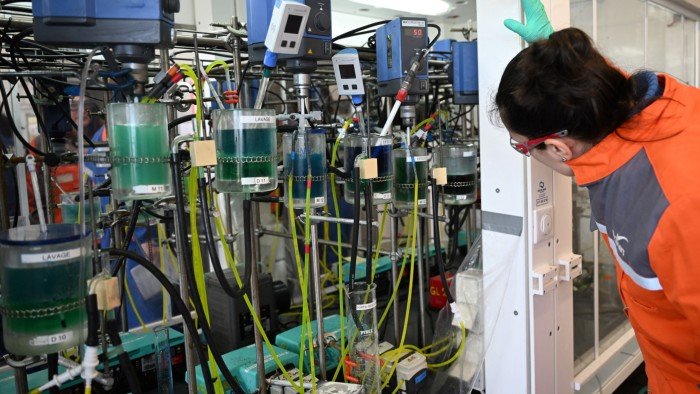Unlock the Editor’s Digest for free
Roula Khalaf, Editor of the FT, selects her favourite stories in this weekly newsletter.
Europe has fallen too far behind in battery technology and should seek partnerships with Chinese groups instead of trying to set up a rival industry, bosses of two of the region’s major metals companies have said.
Their comments come as the continent is still reeling from the collapse this year of Northvolt, the Swedish start-up that was one of Europe’s best funded start-ups and a symbol of efforts to break reliance on China for batteries used in electric vehicles.
But the chair of French miner Eramet, which produces metals used in battery production, and the chief executive of Umicore, a specialist in the production and recycling of battery materials, told the Financial Times that a push to develop an entirely autonomous European industry would not work.
Instead of trying to catch up with Asian counterparts such as battery manufacturer CATL and carmaker BYD, European companies should rather seek partnerships with the Chinese groups to develop a supply chain on the continent, they said. The executives added that policymakers could help the process by requiring Asian companies to invest in local production.
Europe needed to be “realistic” because China had spent two decades perfecting its battery technology and was now a “huge” step ahead, said Christel Bories, who was Eramet’s chief executive until last week.
“Trying to start from scratch without taking advantage of Chinese technology” would not work, she said.
Bart Sap, chief executive of the Belgian-French company Umicore, echoed that sentiment. “We have to embrace China to help produce with us in Europe. Otherwise we are risking mobility dependence,” he said.
The argument is in contrast with the approach of the Trump administration, which is racing to develop a US industry across the critical minerals sector in a bid to cut its dependency on China, including through the imposition of tariffs.
Sap argued for a more co-operative approach towards China. “Instead of tariffs, I’d incentivise that co-operation, those local content requirements. That’s the key for the future,” he said.
Rob Burrell, a battery supply chain researcher at market intelligence firm Project Blue, said decoupling from China was not a realistic option for the European battery industry.
Some Chinese groups are already investing in Europe and setting up partnerships with local companies.
Fiat and Peugeot owner Stellantis and CATL last year announced plans to invest up to €4bn in a battery factory in Spain. BYD is planning to start production at its first European plant, in Hungary, this year while CATL has battery factories in Hungary and Germany.
But campaigners have accused Chinese companies of not sharing their technological knowledge or employing local workers. Julia Poliscanova, from campaign group Transport & Environment, said Europe’s policymakers should improve regulation of such investments.
“They’re not so keen to share the tech, they bring their own people [to work in] key positions in the company, and in a way [Europe is] becoming an assembly plant,” she said. Europe needed “a clear framework around joint ventures — skills and IP sharing provisions”, she said.
Umicore’s Sap said more needed to be done to promote domestic recycling of battery materials, as much of the region’s electric and metals waste was currently exported and processed elsewhere.
As Europe had a limited number of mines, “we need to bring those critical metals into Europe and keep them here”, he said.
Last year, Eramet said it would halt plans to develop a battery recycling plant in France because of the lack of battery factories and cathode production, a crucial step in the production of lithium-ion batteries, in the region.

